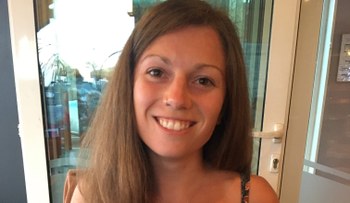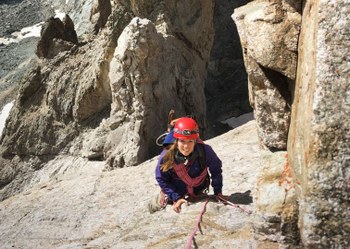Louise is a French and English Student Ambassador and studies for the MA in Specialised Translation at the University of Bologna - Forlì Campus.
Published on 22 August 2022 | Europe

My name is Louise, and I am studying for my master’s degree in specialised translation at the University of Bologna. I am French and English and grew up in both countries. I am currently writing my dissertation and should be graduating soon! I attended both years of the degree programme at Forlì, in the interpretation and translation department (DIT). Although perhaps it would be more accurate to say, I attended a year and a half in Forlì, given that the Covid epidemic hit in my final semester of university. I should also add that I have been living in Florence, Italy, for four years and that my Italian adventure first started in 2014.
Multilingualism runs in my blood
My career path has not been what I would call ‘linear’. Indeed, my first degree was in international politics at the University of Glasgow. Even so, I would say my education has always been centred towards multilingualism. Languages and different cultures have always been an interest of mine which ultimately brought me to the University of Bologna.
The ways of the Italian language are mysterious
I first arrived in Italy in 2014 to start an internship at an international NGO, based in Florence, Italy. As the internship turned into a job opportunity, I was sent to Tunisia to work as a project manager where, ironically, I learnt a lot of Italian. One might ask themselves, as I did at the time, what is the point of learning Italian given that it is only spoken in one country. Simply put – and lovingly put – the Italians are everywhere! If you learn Italian, apart from the beauty of the language, you can connect with people all over the world and find yourself a whole new community. After a year in Tunisia, the NGO in question offered me another opportunity back in Florence. This is how in 2018, after having doubts about my career choices, I was living in Italy and decided to go back to university. I found out that the two best master's programmes for specialised translation were in Trieste and Bologna (or Forlì), and decided to apply.

Entrance exam and previous experience
At the time I did not realise the programme was in Forlì, and I knew and loved the city of Bologna (it is only one hour away from Florence). For these reasons, I chose UNIBO. I found out more about the course, went to Forlì to see the campus, and started studying to improve my Italian in view of the entrance exam. The exam was mainly linguistic and having worked for an international NGO in Italy, I had done a fair amount of translations even though I had never had any professional training. I believe this and my experience teaching English helped me pass the exam.
Transversal skills and a personal relationship with teachers, the strengths of this degree programme
When one thinks of a translation master's, it is natural to think of language skills; however, I believe one of the programme’s greatest strengths has to do with its focus on research skills and its more ‘unusual’ classes (e.g. corpus linguistics, terminology mining, machine translation and post-editing). I feel I have learnt a great deal on how to translate unknown topics and how/where to find the most appropriate terminology.
The ratio of students to teachers is very interesting, allowing for a better rapport with professors. In general, they are very approachable and try to create an inclusive environment. Students create great relationships here, the small numbers make for an ideal environment for everyone to get to know each other. Students who had previously studied at Forlì were of great help, I would even say that they were a fundamental source of information and support.

Unibo’s Multicampus: great contrasts
The main university campus is spread across the city of Bologna and is beautiful and historic, it reminded me of the old university buildings in Glasgow and in Oxford. In contrast, the campus in Forlì has a very modern twist to it and is concentrated in different 'hubs'. I particularly enjoyed studying in the common areas of the Teaching Hub as it has floor to ceiling windows, providing plenty of natural light, and a lovely view onto the surrounding green space. Someone who wishes to live in a vibrant city, with plenty of activities and nightlife would do well to live in Bologna, while Forlì has a more intimate feel.
Part-time living in Forlì
Before the pandemic, I spent part of my time in Forlì and part of my time in Florence. Therefore, I kept my flat in Florence and stayed at an Airbnb while I was in Forlì. I would take the train and study during the trip. Even though I split my time between two cities, I was still able to create some lasting friendships with my fellow students.
Florence has become my home and the ease with which I was able to travel between the two has allowed me to continue to participate in my usual activities in my free time.
I love mountaineering, climbing, hiking, snowboarding, and even though Tuscany and Emilia Romagna might not seem like the most mountainous areas, the Appennini are a great place for these activities. In addition, it is quite easy to run off to other areas in the north of Italy. Forlì also has a few indoor climbing walls where I was able to train.